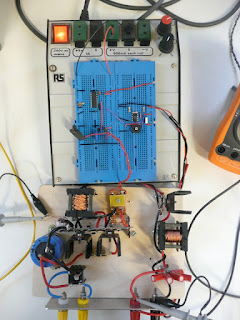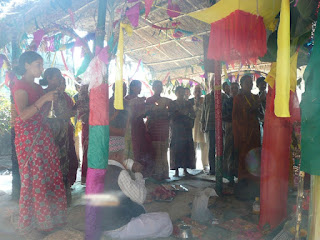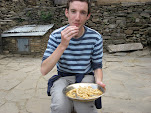I received an email from the Foreign Office two days ago. It noted the update of the Nepal political profile. The update said something along the lines of:
"There are student elections happening at Colleges across Nepal for the next few days. These can often cause violence. Stay away from large gatherings."
I also received a phone call at the same time. Well, I didn't actually receive it, Achut did, but it was for me. It was from one of the Student Union leaders at Patan Multiple Campus, and they wanted me to come and vote. And everything all came flooding back to me.
In September, I was knee deep in visa mud. The visa that I was told I could get by the Immigration Department was not possible, as I didn't work for one of the large INGOs. So, I had to find another way or leave - and there was no way I was going to leave that early in my year. My options were severely limited. There was a man outside the immigration office who offered to get me the paperwork for a marriage visa for a small fee, or I could get a student visa. I am a hideously bad liar, and despise the moral quandary that lying puts me in, but I wanted to stay. So, I pursued the route of a student visa. I enrolled in a local college on an MA Sociology programme and got all the paperwork I needed in 3 days. But this was only with the help of the one of the college's student unions and an aspiring political leader, Gyanu.
So, when Gyanu called Achut and said it was time for me to fulfil my part of the deal, I was a bit concerned. It wasn't about the message from the foreign office. They send out these messages to cover their backs in case something happens. But in Nepal, student politics is very similar to mainstream government politics.
There are many different student unions, all with mainstream party support. Gyanu's party was the Communist Party of Nepal - United Marxist Lenin, known as the UML. There were also Maoists, Congress and all the other major and minor parties going to be represented. As well as this, all the political leaders from the past 60 years of "democracy" in Nepal have come from the student unions. So, it is the place where everyone wants to be the leader to ensure a cushy life after 5-10 years. Politics is seen as an easy career, where you have power, money and people respect you.
As I said though, student politics and mainstream governmental politics is not very different. So, there is also the fighting between the rival parties and their vigilante forces. That's what I was scared of. What if I were associated with one of the parties, whose policies and aims I didn't necessarily agree with, and paid the price? There had been stories in the Nepali media for the last few days of clashes between parties, the Maoist's Young Communist League fighting running street battles with the UML's Youth Force. On several campuses the elections had been postponed due to violence. In the east of the country, someone was even killed.
So on the morning of the student elections I woke up with a rather large lump in my throat.
And then I thought I saw my way out. "Achut, I can't vote today, I don't have a Student ID card." I breathed a sigh of relief. But it was short lived. "That's OK, Gyanu's made you one. He'll get it to you when you arrive at college." Expletive. So, at 7.30 we headed down towards the college. About 200m from the gate we were stopped by riot police. A good sign. From there we had to walk. Bikes were not allowed.
As we walked onto the square, there were thousands of people queuing. This was strange to me, as Nepali people are appalling at queuing. I suppose it wasn't the most organised queue in the world, but it was a queue all right. The queue was split into male and female. We met one of the UML student union's leaders and he presented me my student ID card. I was concerned at the fact that I would have to stand at the back of the queue, which didn't seem to be moving at the moment, and so it wouldn't be until lunchtime probably that I would get back home again. However, I was pushed to the front of the line.
An Armed Police Force man was blocking the gate, not letting people in. He looked rather officious stood there, an 8 ft long bamboo pole in his hand, body armour and a helmet protecting him. But in his eyes there was something else. It was fear. The knowledge that this mass of hundred and thousands of students could explode at any moment and he would be caught in the middle of it. He stood in the way, letting some people through, but not me. Why should he let me though, he asked. That was a good point. As I have just said, I effectively pushed in front of almost a thousand others, just because I was white. Surely this was not on. But, my minders and Achut somehow got me through, the gift of the gab was on their side.
I walked down a passageway. On either side it was lined with more APF men in various states of body armour dress, some carrying rifles, others machine guns, and some - like the gatekeeper - the thick 8 ft bamboo pole. These guys were laughing and joking, but still the same wariness was in their eyes. Achut, for some reason, had not come down with me. I kept on walking and approached a gateway which led into a small courtyard. There was a basketball court on my left hand side, on the right was a university building - concrete with peeling yellow paint, and huge posters of the candidates - and in front of me were two lanes, one for the females and one for males.
I walked into the lane that seemed to have the males in it and ambled slowly to the front of the queue. Achut still hadn't arrived, I was getting worried. I was in a strange and potentially violent place with people I didn't know lining up for my democratic right as a student. I noted the irony as I had never exercised my democratic right in the UK for one reason and another, but coming here to the world's newest federal republic I was going to vote for the first time. Finally Achut turned up. He was in his element, surrounded by people he knew, his ability to talk his way around, through and about anything and surrounded by people who exuded the cockiness that Achut mimicked. He promptly pointed out a big piece of brown paper next to me and told me I would be in room 4 to vote, and then ambled off.
I was now in the line with 20 or 30 people behind me. I tried my best to blend in, but being white and 6 ft 3 it was quite difficult. I started to read the brown paper next to me. It listed all the subjects being studied at the college and where they would need to go to vote. Suddenly I was accosted from behind.
"Hello Comrade!"
This was the first time I had ever been referred to as comrade. I felt I was back in the Cold War USSR.
"Hello" I replied.
"I'm going to vote for the Revolutionary Free Students Union [the Maoist associated union]. Who are you going to vote for?" he asked.
"I'm going to be voting for the UML." I said, pointing at the huge picture of Gyanu and his party members staring at me from the paint-peeling building. I couldn't quite remember what their party was actually called.
"Why are you voting for them? They are all corrupt, steal money, the Revolutionary are much better." He said.
And just as he finished, Jitendra, the leader of the UML student union at Patan Campus, came by and gave me a big handshake. After that, my comrade friend stood rather quietly behind me. Jitendra handed me a piece of card and said "Vote for these people, second column on the sheet" and pointing out the list of people on the back of the card. So it was going to be easy to get it right, as long as I wasn't slipped a different card...
The line in front and behind me started to get agitated. We had been waiting for an hour or so already, voting should have started 20 minutes before. The line, supposed to be single file, was becoming fat. So when election officials tried to thin down the line, the line didn't move, but just tried to squash more people in a smaller space. I was squashed between the comrade behind me and a lanky Madeshi in front. Both of them, I noticed, had rather bad dandruff. I hoped I didn't.
In the line opposite, the females were standing looking slightly unimpressed. They were in a mix of clothes, some in kurta surwals - a traditional Nepali/Indian fashion, others wearing t-shirts and jeans, but all looking stunning. Some were quiet and reserved, whispering amongst themselves. Others were giggling and laughing, People walked past wearing huge poppies for their respective parties, chatting with friends and supporters. This election didn't seem about policy or idealism - it was about personality and family loyalty. You voted for the person you liked or the party your family liked.
After a large time of procrastination, waiting and general confusion, people started to go in to vote. 5 at a time were let in from each line, then a couple of minute wait. Eventually I was let through. My student card was checked and I was allowed past a scary looking police man carrying a radio - the reason he was scary was his height, nearly the same as mine which is huge for a Nepali. Achut guided me into a quadrant inside the yellow paint-peeling building where there were hundreds of election officials. I was led over to a table and I handed my ID card over. The man in front of me looked through his list. He found my name, or at least a version of my name - Samwily Jemeson. Three other people then checked my name against their sheets before my nail was inked by a young lady and I was handed a huge ballot paper. I walked into the room with my card of the people I needed to mark and found the second column. I noticed Gyanu's name and Jitendra's also, so promptly ticked all the names in the second column as I had been instructed. Then, feeling happy with myself that I had finally repaid my debt to the student activists at Patan, walked out of the room and posted my ballot in the box.
After voting I was ushered through another pathway with many APF men waiting around, but I tried not to hang around too much. Within 5 minutes we were back on the bike and I was home for breakfast.
 My hand, my student ID and the card telling me who to vote for
My hand, my student ID and the card telling me who to vote for
In the evening, after the voting had finished I heard there were running street battles between the Maoist YCL and the UML's Youth Force. I even heard one of my minder's in the college during the day had lost their tooth. The next day there were big celebrations for Gyanu and Jitendra, they had won. Not only had they won, but the UML had also won in the neighbouring Pulchowk Engineering campus, so a large celebration march took place down the main street in Patan with flowers and red powder - the signs of celebration.

Gyanu (in front) and Jitendra (a little behind) celebrating their victory
After the victory, I asked Achut what it would mean now. Student unions in the UK being fairly inert organisations I wasn't sure what they did in Nepal apart from fight each other. Apparently, Jitendra, the new Patan Campus Student President, would now be second to the Principal of the college, effectively controlling it. he would command a large budget and able to influence the way the college moves forward. Not a bad job I suppose.
So, my first brush with democracy since the ill fated mock European elections of 1999 whilst attending 6th form - we were the countryside party, on the country's side - and I didn't get beaten, killed or intimidated. Not only that, but my team won. Most excellent. I now have friends in high places!
SAM












